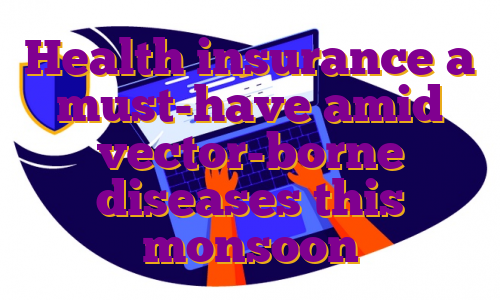The awaited arrival of the monsoon is a refreshing breather after the scorching heat of the summer. As much as we love the rains, it is also true that monsoons are the time when we become a lot more vulnerable to diseases than any other season.
Dengue, Chikungunya and Malaria are some of the common diseases that this season brings along. So it is natural for one to be worried about their health during the monsoon season. However, a season as lively as monsoon deserves to be thoroughly enjoyed without having to worry about such health risks. A health insurance plan can help in protecting you and your family while you soak in the joys of the rainy season.
How can health insurance help during monsoons?
Talking about India, millions of people get infected by dengue, a deadly vector-borne disease, every year. Most of those cases are reported during the monsoons. In fact, of all the malaria cases that are reported in the South East Asian Region, around 70 per cent are reported in India. Dengue and malaria are not the only diseases which are common during the monsoons. Other ailments like typhoid, cholera and Hepatitis-A are also more common due to water logging and a general conducive environment for the growth of microorganisms during this season.
A health insurance policy is a must for anyone at any and all times. However, with monsoons leading to puddles of stagnant water, clogged drains and high humidity, it all leads to conducive conditions potent for the growth and spread of harmful microorganisms. Mosquitoes and other vectors are rampant, which can lead to serious health risks. Since all this leads to more chances of one falling sick and needing hospitalisation, health insurance can cover the cost of such hospitalisation providing you much-needed support during your time of need.
Vector-borne disease-specific health cover
Most health insurance plans cover hospitalisation costs due to vector-borne diseases. Not only that, several health insurance companies have now come up with plans specially designed for the risks associated with monsoons and the vector-borne diseases that they bring along. Vector-borne disease covers are available as add-ons to your basic insurance plan, or also as stand-alone plans. While a regular health insurance plan covers only the hospitalisation costs, a vector-borne disease covers both inpatient and outpatient medical expenses. Coverage includes the cost of medicine, diagnostic tests, doctor’s fees, blood transfusion etc. The best part is that such a cover is quite inexpensive and can start at a premium as low as Rs 150-200. Most vector-borne specific health insurance policies have a policy term of one to three years with the sum insured generally ranging between Rs 10,000 to Rs 75,000.
However, such policies cover only specific diseases like Dengue, Malaria, Chikungunya, Filariasis, Kala Azar, etc.
Which health insurance cover should you get for monsoons?
A vector-borne-specific cover is like a specialisation that makes sense only if the basics are covered. So it is advisable that one must get a comprehensive health insurance policy first which protects them from all kinds of ailments, and in case of hospitalisation due to any reason, including vector-borne diseases like malaria, dengue and chikungunya. One should consider a cover of at least Rs 25 lakh for their family when buying a comprehensive health insurance plan. Once that is covered, then you can think of getting some additional protection for the monsoon season through a specific cover. Since these covers are truly inexpensive and provide coverage for events that are usually not covered by regular plans, one can consider them as an add-on to their basic policy for that extra layer of protection.
Through a combination of a basic health cover and vector-borne disease add-on cover, you would be fully prepared for the vagaries of the weather come monsoon season. However, as the saying goes, prevention is always better than cure. So while it is a must to have coverage against any uncertainty, it is even more important to protect your health by following good hygiene practices and avoiding activities and foods that may harm your health. However, if there is any symptom of vector-borne or water-borne disease seen in any family member during this weather, one must seek medical help without any delay. And with the insurance policy backing you, you can be free of any worry about the cost of treatment and can just focus on recovery.
The author is Head-Health Insurance at Policybazaar.com. The views expressed are that of the author.
!function(f,b,e,v,n,t,s)
{if(f.fbq)return;n=f.fbq=function(){n.callMethod?
n.callMethod.apply(n,arguments):n.queue.push(arguments)};
if(!f._fbq)f._fbq=n;n.push=n;n.loaded=!0;n.version=’2.0′;
n.queue=[];t=b.createElement(e);t.async=!0;
t.src=v;s=b.getElementsByTagName(e)[0];
s.parentNode.insertBefore(t,s)}(window, document,’script’,
‘https://connect.facebook.net/en_US/fbevents.js’);
fbq(‘init’, ‘444470064056909’);
fbq(‘track’, ‘PageView’);
.


